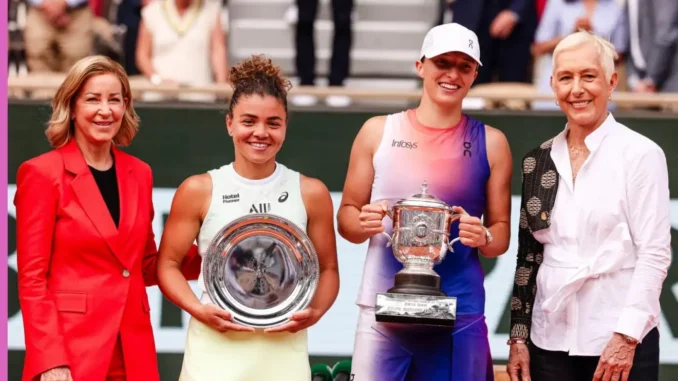
Chris Evert, an 18-time Grand Slam champion and one of tennis’s most iconic figures, once wielded unparalleled influence over the women’s game, shaping its direction alongside her great rival and friend, Martina Navratilova. In a candid reflection, the former world No. 1 revealed the extent of her authority during her playing days, a time when she and Navratilova could sway major decisions in the sport. Now, at 70, Evert has stepped away from craving that power, finding fulfillment in mentoring young players and advocating for the future of tennis, while navigating personal challenges, including her battle with ovarian cancer.
In the 1970s and 1980s, Evert was more than a tennis superstar; she was a cultural phenomenon. With her signature two-handed backhand and poised demeanor, dubbed the “Ice Maiden,” she revolutionized women’s tennis, making it acceptable for female athletes to be both fiercely competitive and feminine. “The culture at that time was that women athletes were frowned upon. They were strong. That was everything the culture dictated that a woman wasn’t,” Evert recalled. Her presence, complete with stylish tennis dresses and ribbons, inspired a generation, proving that athleticism and grace could coexist. “I think that was my impact, making it OK for young girls and women to be athletes, bringing along a whole new generation,” she said. Her record speaks for itself: 157 singles titles, a 90% win rate, and a staggering 94.55% clay-court win percentage, including seven French Open titles, a benchmark only Rafael Nadal has surpassed.
During her prime, Evert’s influence extended far beyond her on-court dominance. Alongside Navratilova, she held sway over the Women’s Tennis Association (WTA), which was founded in 1973 by Billie Jean King to promote women’s professional tennis. “We had a lot more influence back then than players do now,” Evert shared. “We were a much smaller group of people and if Martina or I said we didn’t want something to happen, it didn’t happen.” Their authority was significant enough to halt proposed changes to the sport, from tournament schedules to strategic directions. Evert’s role as vice president under King’s WTA presidency gave her a front-row seat to shaping the tour, ensuring it provided opportunities for hundreds of women to earn a living. “We were trying to create a tour that could possibly allow 200-300 women to have a tour that would allow them to earn a living,” she explained, emphasizing the legacy of equal prize money, first achieved at the 1973 US Open.
Today, the landscape of tennis has transformed into a global business, with billions in endorsements, sponsorships, and broadcasting deals. Evert acknowledges the shift, noting, “Now, the sport is such a big business and we are talking about billions of dollars involved in tennis all over the globe with endorsements, sponsorships and TV. So it’s better that we have professionals running that side of the game.” She supports the current structure, where the WTA Players’ Council provides input, but professional administrators handle the complexities of a modern sport. This evolution has allowed Evert to step back from the desire to control the game’s direction, finding peace in her role as a mentor and commentator for ESPN and Eurosport.
Evert’s perspective was recently tested by the controversial decision to host the WTA Finals in Saudi Arabia, a move she and Navratilova opposed due to the country’s human rights record. “Martina and I disagreed with that decision on Saudi Arabia and we spoke out about it,” she said, highlighting their continued commitment to advocating for the sport’s integrity. Despite their objections, the decision proceeded, reflecting the diminished influence of even the game’s legends in today’s corporate-driven tennis world.
Now, Evert channels her energy into giving back, coaching at her Evert Tennis Academy in Florida and supporting initiatives like the National Junior Tennis and Learning Centers. “To be a mentor, because I’ve lived such an interesting life, and I’ve acquired a lot of wisdom. And I feel like I can give that to people,” she said. Her battle with Stage 1 ovarian cancer, diagnosed in 2021 after a preventive hysterectomy, has further shaped her outlook. Inspired by her sister Jeanne’s death from the same disease, Evert became an advocate for early detection, stating, “We need to have these conversations. Ovarian cancer is a very deadly disease. Any information is power.” Declared cancer-free in 2022 after chemotherapy, she continues to inspire, using her platform to support others, much as Navratilova supported her during treatment.
Evert’s journey reflects a life of purpose, from redefining women’s tennis to embracing a quieter, yet impactful, role. Her friendship with Navratilova, now spanning five decades, remains a testament to her legacy of connection and resilience. As she navigates this “third chapter” of life, Evert finds joy in mentoring the next generation, leaving the power struggles behind for a legacy of inspiration.
Leave a Reply